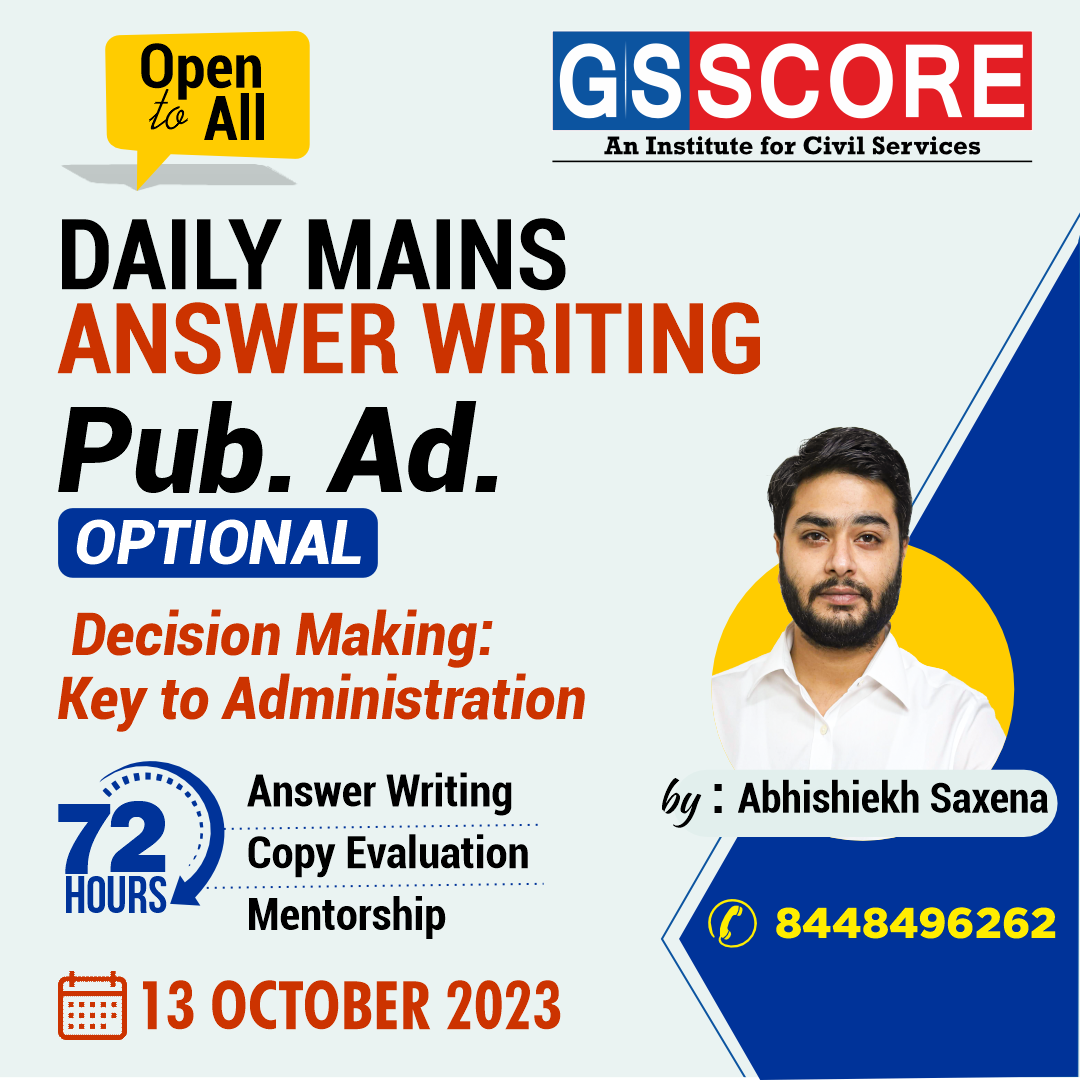


Instruction:
- There will be 2 questions carrying the First Question is-10 marks Write your answers in 150 words and the Second Question is-15 marks Write your answers in 250 words.
- Any page left blank in the answer-book must be crossed out clearly.
- Evaluated Copy will be re-uploaded on the same thread after 2 days of uploading the copy.
- Discussion of the question and one to one answer improvement session of evaluated copies will be conducted through Google Meet with concerned faculty. You will be informed via mail or SMS for the discussion.
Question #1. Critically analyze the classical view of Decision Making. 10 marks (150 words)
Question #2."Decision-making is the heart of administration, and that the vocabulary of administrative theory must be derived from the logic and psychology of human choice” (Simon). Comment. 15 marks (250 words)
(Examiner will pay special attention to the candidate's grasp of his/her material, its relevance to the subject chosen, and to his/ her ability to think constructively and to present his/her ideas concisely, logically and effectively).
STEPS & INSTRUCTIONS for uploading the answers
Step 1 - The Question for the day is provided below these instructions. It will be available at 7:00 AM.
Step 2 - Uploading of Answers : Write the answer in A4 Sheet leaving proper margins for comments and feedback and upload the PDF in MY ACCOUNT section. Click on the option of SUBMIT COPY to upload the PDF.
Step 3 - Deadline for Uploading Answers: The students shall upload their answers by 7:00 PM in the evening same day. The first 50 copies will be evaluated.
Step 4 - Feedback : Mentors will give their feedback for the answers uploaded. For more personalised feedback, join our telegram channel by clicking on the link https://t.me/mains_answer_writing_cse . A one-to-one session will be conducted with the faculty after copy evaluation in 72 Hrs.
Model Answer
Question #1. Critically analyze the classical view of Decision Making. 10 marks (150 words)
The Classical School of Administration consisting of scholars like Henri Fayol, Gullicketc had a very simple and rigid approach to the study of the process of decision making that involved a series of steps like:
- Identification and analysis of the problem in context of the goals and objectives.
- Conceptualization of alternatives and collection of relevant pieces of information.
- Choosing the best course of action or alternative that would bring the best return.
- Implementing the decision
- Evaluating the effectiveness of the decision.
It is a very casual assumption here that all the above steps are simple to follow and that the administrator is bound to have all the relevant knowledge and sure shot prediction of success by choosing the best course of action (Decision). In reality the process is quite complex and not as simple as mentioned above as there are many unforeseen factors that crop up. However, this classical approach of decision making was the basis for the building of the Behaviourist School and the idea of studying decision making in detail sprouted from the above mentioned missing links.
Question #2."Decision-making is the heart of administration, and that the vocabulary of administrative theory must be derived from the logic and psychology of human choice” (Simon). Comment. 15 marks (250 words)
Answers
Herbert Simon was the most important critics of principles of administration and described them as “proverbs”. He advocated behavioural approach to public administration to make it more scientific discipline. He focused upon decision making as the alternative to the principles approach. of classical theorist.
It asserts that “decision- making” is the heart of administration, and that the vocabulary ofadministrative theory must be derived from the logic and psychology of human choice”, and itattempts to describe administrative organisation”in a way that will provide the basis for scientific analysis”.
Decision-Making and Administrative Organisation
Simon distinguishes between “value judgments” (which “lead toward the selection of final goals”) and “factual judgments” (which “involve the implementation of such goals).
The relationship of the individual and the group in decision-making is explored; for example, influences upon individuals include authority, organisational loyalty, efficiency, advice and information, and training.
The Logic and Psychology of Administrative Decisions:
In “”The Limits of Rationality”, Simon wrote, actual behaviour falls short, in at least three ways, of objective rationality...
1. Rationality requires a complete knowledge and anticipation of the consequences that will follow on each choice. In fact, knowledge of consequences is always fragmentary.
2. Since these consequences lie in the future, imagination must supply the lack of experienced feeling in attaching value to them. But values can be only imperfectly anticipated.
3. Rationality requires a choice among all possible alternative behaviours. In actual behaviour, only a very few of all these possible alternatives ever come to mind.
Simon, “rejected the notion of an omniscient ‘economic man’ capable of making decisions that bring the greatest benefit possible and substituted instead the idea of ‘administrative man’ who ‘satisfices’—
looks for a course of action that is satisfactory’”. Administrative Behaviour laid the foundation for the economic movement known as the Carnegie School.
Simon, recommend an empirical approach to study of public administration. Thus, as Mohit Bhattacharya puts it, “he brought in the perspective of logical positivism in the study of policy making and the reaction of means and ends. Reflecting the perspectives and methodology of ‘behaviouralism’ in the psychology and social psychology. Administrative behaviour pleaded for the raising of scientific vigour in public administration.

